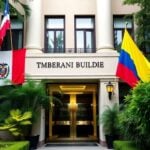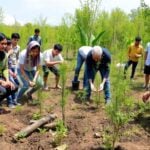Fellowships play a crucial role in the realm of peacebuilding and conflict resolution, providing individuals with the necessary resources, training, and networks to effect meaningful change in their communities. These programs often offer financial support, mentorship, and access to a community of like-minded professionals dedicated to fostering peace. By participating in a fellowship, individuals not only gain valuable skills and knowledge but also enhance their credibility and visibility within the field.
This can lead to greater opportunities for collaboration and impact, as fellows often become part of a global network of peacebuilders who share insights and strategies for addressing complex conflicts. Moreover, fellowships can serve as a catalyst for innovative approaches to conflict resolution. Many programs encourage fellows to develop and implement projects that address specific issues within their communities, allowing them to apply theoretical knowledge in practical settings.
This hands-on experience is invaluable, as it equips fellows with the tools needed to navigate the challenges of peacebuilding work. Additionally, the exposure to diverse perspectives and methodologies fosters creativity and adaptability, essential traits for anyone working in conflict resolution. Ultimately, fellowships not only empower individuals but also contribute to the broader goal of sustainable peace by nurturing a new generation of leaders committed to resolving conflicts.
Researching Available Fellowships and Grants
Researching Available Fellowships and Grants
The first step in securing funding for peacebuilding initiatives is to conduct thorough research into available fellowships and grants. Numerous organizations, both governmental and non-governmental, offer financial support for projects aimed at conflict resolution. Online databases such as GrantStation, Foundation Center, and Idealist can be invaluable resources for identifying potential funding opportunities.
Targeted Search and Networking
Additionally, many universities and research institutions maintain lists of fellowships specific to peace studies or international relations, which can provide targeted options for applicants. Networking is another effective strategy for discovering fellowship opportunities. Engaging with professionals in the field through conferences, workshops, or online forums can lead to valuable insights about lesser-known programs.
Leveraging Personal Connections and Social Media
Many successful fellows have found opportunities through word-of-mouth recommendations or by connecting with mentors who have navigated similar paths. Furthermore, social media platforms like LinkedIn and Twitter can be powerful tools for following organizations that offer fellowships, allowing individuals to stay updated on application deadlines and program announcements.
Identifying Eligibility Criteria and Application Requirements
Once potential fellowships and grants have been identified, it is essential to carefully review their eligibility criteria and application requirements. Each program has specific guidelines regarding who can apply, which may include factors such as educational background, professional experience, or geographic location. Understanding these criteria is crucial to avoid wasting time on applications that do not align with one’s qualifications.
In addition to eligibility requirements, applicants must also familiarize themselves with the application process itself. This often includes submitting a personal statement, project proposal, resume or CV, and letters of recommendation. Each component serves a distinct purpose; for instance, the personal statement allows applicants to articulate their motivations and aspirations within the field of peacebuilding.
By thoroughly understanding what each fellowship requires, individuals can tailor their applications to meet the expectations of the selection committee effectively.
Crafting a Strong Application and Personal Statement
A compelling application is essential for standing out in a competitive pool of candidates. The personal statement is particularly important as it provides an opportunity to convey one’s passion for peacebuilding and conflict resolution. To craft an engaging narrative, applicants should reflect on their experiences that have shaped their commitment to this work.
This could include personal stories of conflict or resilience, academic pursuits related to peace studies, or professional experiences in conflict-affected areas. In addition to personal anecdotes, it is vital to articulate clear goals for the fellowship experience. Applicants should outline how the fellowship will enhance their skills and contribute to their long-term career objectives in peacebuilding.
Specificity is key; instead of vague aspirations, candidates should detail how they plan to apply the knowledge gained during the fellowship to real-world challenges. Furthermore, aligning personal goals with the mission of the fellowship program can demonstrate a strong fit between the applicant and the organization.
Seeking Letters of Recommendation and References
Letters of recommendation are a critical component of any fellowship application, providing external validation of an applicant’s qualifications and character. When seeking references, it is important to choose individuals who are familiar with one’s work ethic, skills, and commitment to peacebuilding. Ideally, these should be professionals who can speak to specific experiences or projects that highlight the applicant’s capabilities in conflict resolution.
To ensure that recommenders provide strong letters, applicants should communicate clearly about the fellowship’s goals and their own aspirations. Providing recommenders with a brief overview of relevant experiences and achievements can help them craft personalized letters that resonate with the selection committee. Additionally, giving recommenders ample time to write their letters is crucial; a rushed letter may lack depth and insight.
Following up with a thank-you note after receiving a letter is also a thoughtful gesture that maintains positive relationships for future endeavors.
Navigating the Interview Process
Introduction to Fellowship Interviews
For many fellowships, an interview is a critical step in the selection process. This stage provides an opportunity for applicants to further demonstrate their passion for peacebuilding and articulate how they would benefit from the fellowship experience. Preparation is key; candidates should familiarize themselves with common interview questions related to conflict resolution and be ready to discuss their proposed projects in detail.
Preparing for the Interview
Practicing responses with peers or mentors can help build confidence and refine communication skills. Additionally, applicants should be prepared to ask insightful questions about the fellowship program itself, demonstrating genuine interest and engagement.
Conveying the Right Attitude
It is also important to convey adaptability and openness during the interview; many fellowship programs value candidates who can think critically about challenges and propose innovative solutions. This mindset is essential for success in peacebuilding and conflict resolution, and applicants should be prepared to showcase their ability to approach complex problems with creativity and flexibility.
Final Tips for Success
By being well-prepared, confident, and genuinely interested in the fellowship program, applicants can increase their chances of success and make a positive impression on the interviewers. This, in turn, can lead to a valuable and enriching experience for the selected candidates, and ultimately contribute to the advancement of peacebuilding efforts.
Securing Funding and Support for Peacebuilding Projects
Once awarded a fellowship or grant, securing additional funding or support for peacebuilding projects may be necessary to ensure successful implementation. This could involve seeking partnerships with local organizations or businesses that share similar goals. Collaborating with established entities can provide access to additional resources, expertise, and networks that enhance project outcomes.
Moreover, leveraging social media platforms can be an effective way to raise awareness about ongoing projects and attract potential donors or supporters. Sharing updates on progress, challenges faced, and successes achieved can engage a broader audience interested in supporting peacebuilding initiatives. Additionally, applying for smaller grants or crowdfunding campaigns can supplement funding received from fellowships, allowing for more comprehensive project execution.
Making the Most of Fellowship Opportunities for Professional Development and Networking
Fellowship programs often provide unique opportunities for professional development and networking that can significantly enhance one’s career in peacebuilding. Engaging actively in workshops, seminars, and networking events organized by the fellowship can lead to valuable connections with other professionals in the field. Building relationships with fellow participants can foster collaboration on future projects or initiatives.
Furthermore, taking advantage of mentorship opportunities offered by fellowship programs can provide guidance from experienced professionals who have navigated similar paths. Mentors can offer insights into career development strategies, help refine project ideas, and provide feedback on proposals or applications for future funding opportunities. By fully immersing oneself in the fellowship experience and actively seeking out learning opportunities, individuals can maximize their growth potential within the field of peacebuilding.
In conclusion, pursuing fellowships in peacebuilding and conflict resolution requires careful planning, research, and dedication. By understanding the importance of these opportunities, conducting thorough research on available programs, crafting strong applications, seeking meaningful recommendations, navigating interviews effectively, securing additional funding support, and maximizing professional development opportunities, individuals can significantly enhance their chances of success in this vital field. The journey may be challenging but ultimately rewarding as it contributes not only to personal growth but also to the broader mission of fostering sustainable peace worldwide.


























